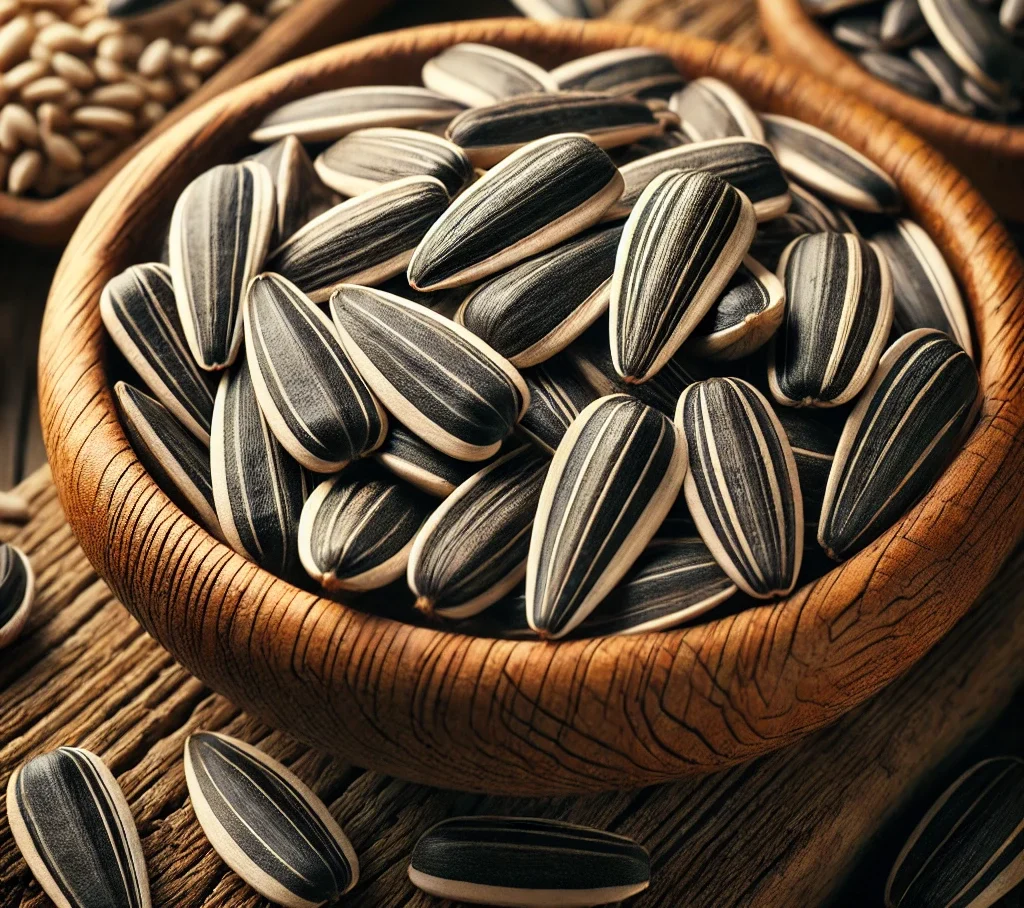Sunflower seeds are a nutrient-rich snack that offers a variety of health benefits. Packed with protein, healthy fats, fiber, and essential vitamins and minerals, these tiny seeds support heart health, boost immunity, and promote glowing skin. Eaten on their own, sprinkled on salads, and blended into spreads, sunflower seeds are a delicious and convenient way to enhance your diet.
Nutritional Benefits of Sunflower Seeds
Rich in Nutrients: Sunflower seeds are an excellent source of plant-based protein and healthy fats, particularly polyunsaturated fats and omega-6 fatty acids. Sunflower seeds are also rich in vitamins, including vitamin E, B vitamins (such as B1, B6, and folate), and minerals like magnesium, phosphorus, selenium, and iron. Additionally, the antioxidants found in sunflower seeds help protect the body from oxidative stress.
Source of Plants-based Protein: Sunflower seeds provide a good amount of plant-based protein, making them a great option for vegetarians and vegans. With around 6 grams of protein per ounce, they support muscle repair, immune function, and overall bodily processes.
Packed with Antioxidants: Sunflower seeds are rich in antioxidants, such as vitamin E, which protect cells from oxidative damage and reduce the risk of chronic diseases like heart disease and cancer. Vitamin E also promotes skin health and may help reduce signs of aging.
Rich in Healthy Fats: Sunflower seeds are an excellent source of healthy fats, particularly polyunsaturated fats like omega-6 fatty acids. These fats help lower bad cholesterol (LDL), reduce inflammation, and support heart health.
Good Source of Fiber: Sunflower seeds provide a significant amount of fiber, which supports healthy digestion, helps regulate blood sugar levels, and promotes feelings of fullness, making them helpful for weight management.
Boosts Immune Function: Sunflower seeds are a great source of zinc, a mineral essential for maintaining a strong immune system. Zinc helps the body fight off infections, supports wound healing, and plays a key role in cellular function.
Supports Heart Health: The combination of healthy fats, fiber, antioxidants, and minerals like magnesium and potassium in sunflower seeds helps to improve cardiovascular health. These nutrients work together to lower blood pressure, reduce inflammation, and support healthy cholesterol levels.
Improves Skin Health: The vitamin E content in sunflower seeds promotes healthy skin by protecting against sun damage and reducing inflammation. Regular consumption can help maintain glowing skin and reduce the appearance of wrinkles and fine lines.
Supports Bone Health: Sunflower seeds are rich in magnesium, calcium, and phosphorus, which are essential minerals for maintaining strong bones and preventing bone-related conditions like osteoporosis.
Helps Regulate Blood Sugar Levels: The fiber and healthy fats in sunflower seeds contribute to better blood sugar control, making them a good choice for individuals with diabetes or those at risk for developing the condition.
Promotes Mood and Mental Health: Sunflower seeds contain magnesium and vitamin B6, which support brain health, regulate mood, and may help reduce symptoms of anxiety or depression by promoting the production of serotonin.
Uses of Sunflower Seeds
Snacks: Sunflower seeds can be eaten raw, roasted, or flavored as a nutritious snack. They can be enjoyed on their own or mixed with other nuts and seeds.
Culinary Uses: They can be added to salads, granola, oatmeal, and baked goods for added crunch and nutrition.
Sunflower Seed Butter: Similar to peanut butter, sunflower seed butter is a delicious alternative that can be used in spreads or smoothies.
Oil: Sunflower oil, extracted from the seeds, is commonly used in cooking and salad dressings due to its light flavor and high smoke point.
Safety Considerations
Allergies: While sunflower seed allergies are less common than nut allergies, some individuals may still be allergic. Discontinue use if any adverse reactions occur.
Caloric Density: Sunflower seeds are calorie-dense, so portion control is important, especially for individuals managing their weight.
Sodium Content: Salted sunflower seeds can be high in sodium, which may not be suitable for individuals on a low-sodium diet. Opting for unsalted varieties can help mitigate this concern.
Interactions with Medications: Sunflower seeds may interact with certain medications, particularly those affecting blood pressure or cholesterol levels. Consult a healthcare provider if you are on medication.
Conclusion
Incorporating sunflower seeds into your diet is a simple way to boost your nutrition while enjoying a tasty and satisfying snack. Their high content of healthy fats, antioxidants, and essential nutrients makes them a powerful ally for heart health, immune function, and skin vitality. By making them a part of your daily routine, you can reap their numerous benefits in an easy and delicious way.
